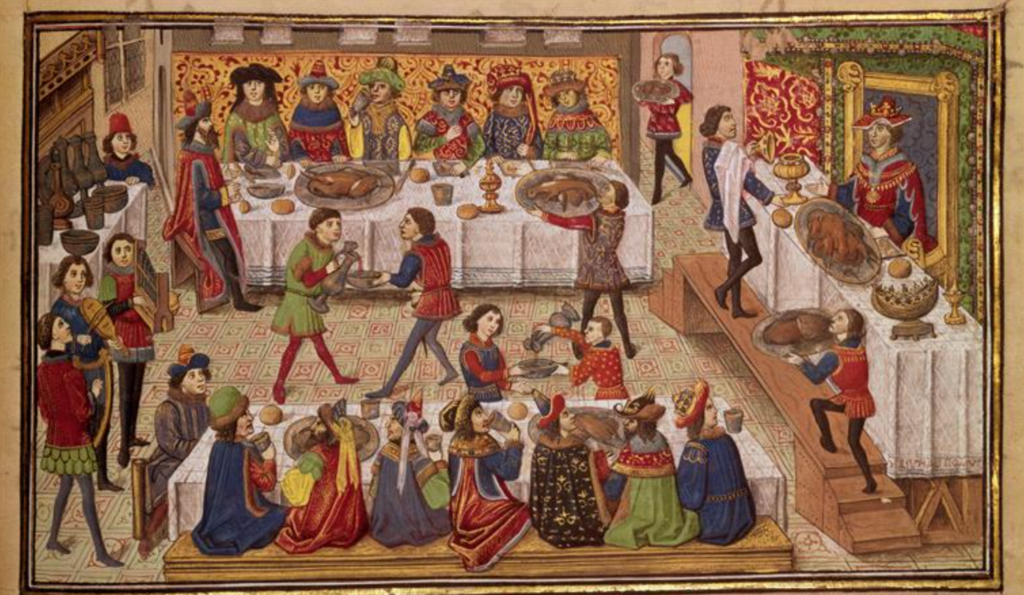by Noble Scandal mac Rofir

One of the most important things I learned early in the Society is that events happen because passionate, organized, generous people make them happen. Like projects across all walks of life, they are born mostly out of hard work by many hands. But first, there has to be a vision. Hearthglow began for me after a conversation with Lady Caran de Berg who had, for years before me, been dreaming of a self-contained event entirely focused on feasting.
Since that seed was planted in my mind, it grew very slowly over the intervening years. In the interim, I’ve met many incredible people, and had some interesting conversations about things like whether or not Feasts are an act of Service or an exploration into Arts & Sciences, and why people have certain ideas one way or another. This story truly begins with my rejection of that entirely, and I posit to everyone that they can absolutely be both.
Hospitality has always been an incredibly important part of my life, and I realized that what makes a Feast truly enjoyable for me is that experience. So very early this year, that idea from years before bloomed – I wanted an event that was entirely devoted to a Feast, but not just food. I wanted to encompass the entire concept of Hospitality and the different ways in which that bears out in culture. The foundation of Hearthglow is a Feast, to be sure. The Event Steward is also the Head Cook (Chef is not the correct term, I will be happy to wax on that another time) and the primary space in our venue will be our Banquet Hall for the day. That Feast, though, is itself a central Arts & Sciences display, with all of the research and documentation one would expect. It will be an immersive, experiential demonstration of a great deal of research.
From that hub, however, a wide variety of other experiences are wont to spring, and room is left in our framework for a variety of complementary activities in both the pursuit of entertainment, and the presentation of additional A&S work by our Populace through displays, performances, or classes. This could include music of all kinds, dancing, theatrical performances, games, brewing, costuming, or really any other field that touches on the broad concept of Hospitality, which includes foodways, customs, etiquette, and accommodation – nearly anything. The catch, as it often is in our Barony, was the venue.
We were extremely fortunate to connect with ThorpeWood, a local venue that has a gorgeous timber lodge and whose mission is to connect with other local nonprofit organizations to provide them with locations and programs to fulfill their mission. The lodge includes a commercial kitchen, a stunning vaulted hall with a stone hearth, an additional room with plenty of space for classes or activities, as well as an outdoor stone bar and adjacent brazier. It will be the picture of comfort and welcome in January, lit by blazing fires and hundreds of candles.
For this year’s event, we’ve chosen to focus on France around the turn of the 15th century, using primarily three excellent sources available to us – Le Ménagier de Paris, Le Viandier de Taillevant, and Du Fait de Cuisine. I selected this time and place because it represents the first marked and documented shift in a “refined” French cuisine, a process that will continue for several more centuries, passing through Nouvelle Cuisine in the 17th century, to reach Escoffier’s pronouncement of the end of medieval cuisine at the start of the 20th century. I am also able to translate the original sources directly, giving me extensive insight when combined with my professional culinary training and experience. All of this made this particular time and place a great choice for the inaugural event.
The primary goal of the event is to interpret a feast for modern cooks and diners, and so we are showcasing a variety of foods that might not have all been served on the same table on the same day. This is largely due to the strict division between “feast” and “fast” days prescribed by the indomitable Catholic Church and its culture at the time. I have also worked hard to ensure that a variety is available for anyone with any kind of eating restrictions, and intentionally avoided the level of ostentatious consumption that would have been fashionable at the time. The day’s menu should provide guests with access to the dishes, flavors, textures, and preparations of the time without being unnecessarily dogmatic and exclusionary. This is, after all, an event about hospitality!
Since the community gave us an overwhelmingly positive response to the event, filling our hall in just a few short days of open registration, we look forward to working hard to make this year’s event incredible in order to lay the foundation for an annual Hearthglow that surveys any and all times and places we celebrate in the SCA. (Rumor has it that the theme for next year is already under discussion, and it’s a pretty awesome one as well!)
Extensive information about the feast and associated research can be found on the Highland Hearthglow website at https://hearthglow.atlantia.sca.org
